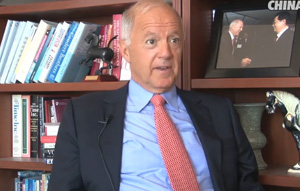China's currency nears equilibrium
Updated: 2013-06-08 14:10
(Xinhua)
|
|||||||||||
BEIJING -- The yuan is nearing equilibrium, as its rate against the US dollar has hit a new high for 19 times since the beginning of April, experts said.
The central parity rate of the yuan strengthened by 117 basis points to reach a new high of 6.1620 against the US dollar on Friday, according to data released by the China Foreign Exchange Trading System.
In China's foreign exchange spot market, the yuan is allowed to rise or fall by 1 percent from the central parity rate each trading day.
The central parity rate of the yuan against the US dollar is based on a weighted average of prices before the opening of the market each business day.
Since the beginning of the year, the yuan has strengthened by 1,277 basis points, or more than 2 percent, against the US dollar. In contrast, the yuan strengthened by 146 basic points during the whole of 2012.
From the beginning of April to Friday, the yuan hit a historic high for 19 times and advanced by 1,054 basis points.
Tan Yaling, head of the China Forex Investment Research Institute, attributed the yuan's rapid appreciation to lingering expectations for the currency to strengthen, as well as market inertia and speculative activity.
Li Jiangjun, a researcher with the International Finance Institute under the Bank of China, said the stronger yuan is partly due to the impact of hot money, or international speculative capital, in China.
"The problem is rooted in quantitative easing policies in major economies that resulted in excessive liquidity," Li said.
To ward off risks stemming from cross-border capital flows, the State Administration of Foreign Exchange issued a circular on reinforcing the management of foreign exchange capital inflow. The reinforcement became effective on June 1.
Tan said the current exchange rate has deviated from the country's real economy.
"Due to weak demand at home and aborad, China's economy is experiencing a downward trend. This does not support the continuous appreciation of the yuan," Tan said.
Data from the National Bureau of Statistics showed that China's GDP expanded 7.7 percent year-on- year in the first quarter, down from 7.9 percent reported in the last quarter of 2012.
China has lowered its economic growth target for the year to 7.5 percent, as it is seeking high-quality growth.
The country's central bank said earlier this year that the ratio of China's current account surplus to its GDP has dropped from more than 10 percent in 2007 to 2.6 percent in 2012, the lowest level since 2005.
Related Stories
Yuan strengthens to new high against dollar 2013-06-07 17:31
New yuan loans continue to drop in May: Report 2013-06-06 06:17
China spends 34.1b yuan on kindergartens over 2 years 2013-06-01 14:27
Yuan may continue to appreciate 2013-06-01 09:57
Hot money behind rising yuan 2013-05-29 09:25
Today's Top News
Police: Gunman killed 4 in California shootings
Chinese, US presidents start talks
Suspect in fatal bus fire identified
Liu Zhijun to stand trial on Sunday
Stakes high ahead of Xi-Obama summit
5.9-magnitude quake jolts Taiwan: CENC
3 missing after Shanghai cargo ships capsize
Gaokao opened to migrant students
Hot Topics
Lunar probe , China growth forecasts, Emission rules get tougher, China seen through 'colored lens', International board,
Editor's Picks

|

|

|

|

|

|





